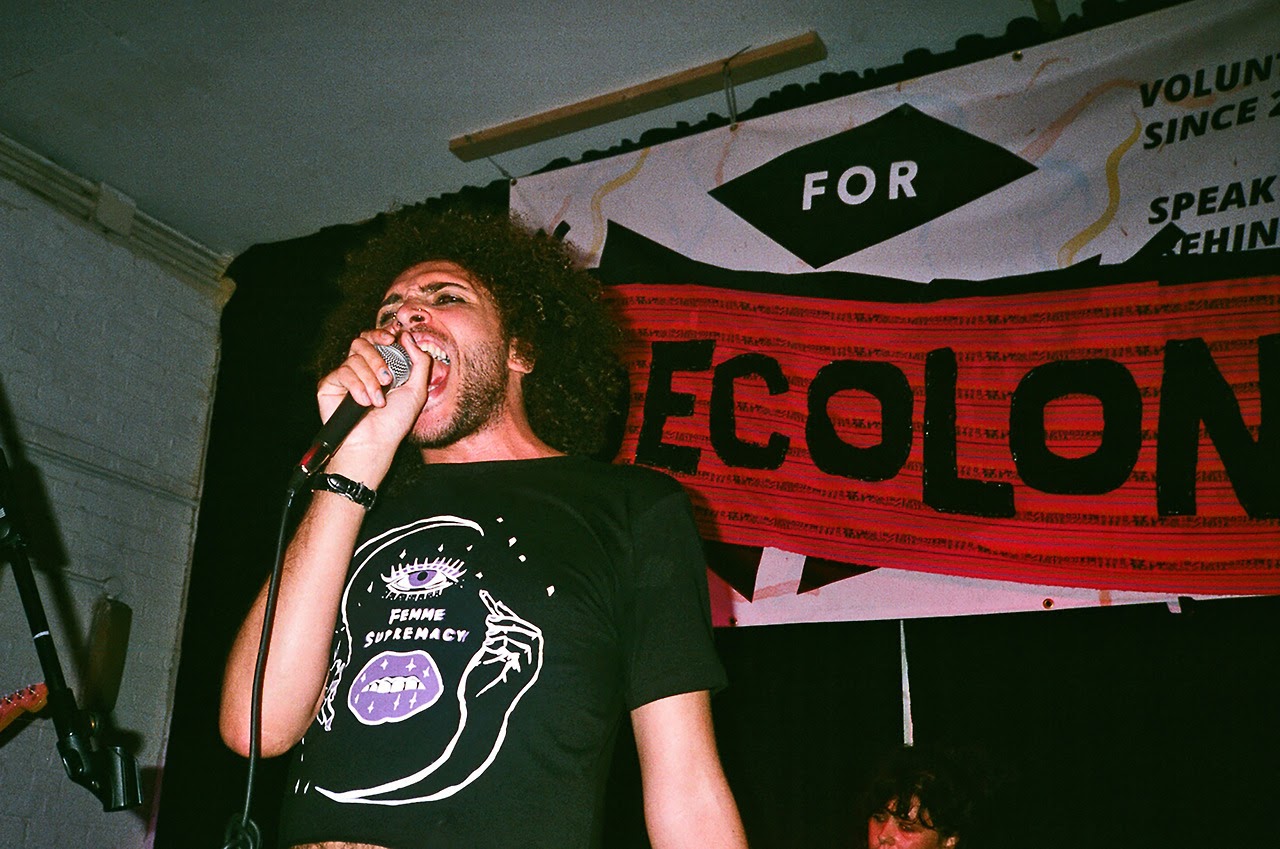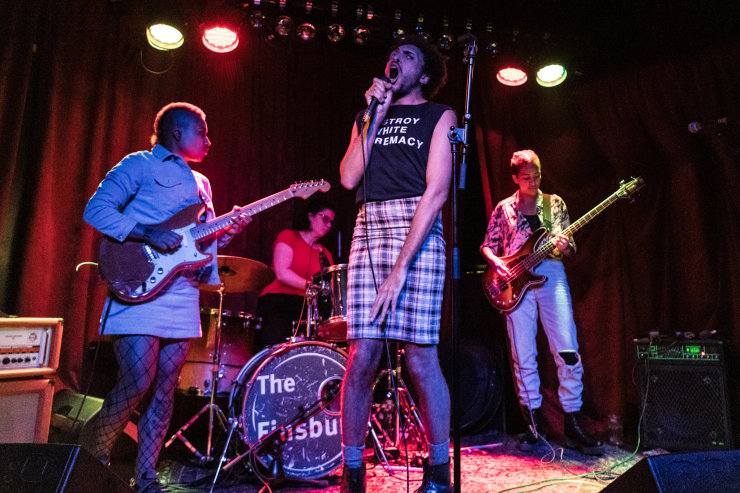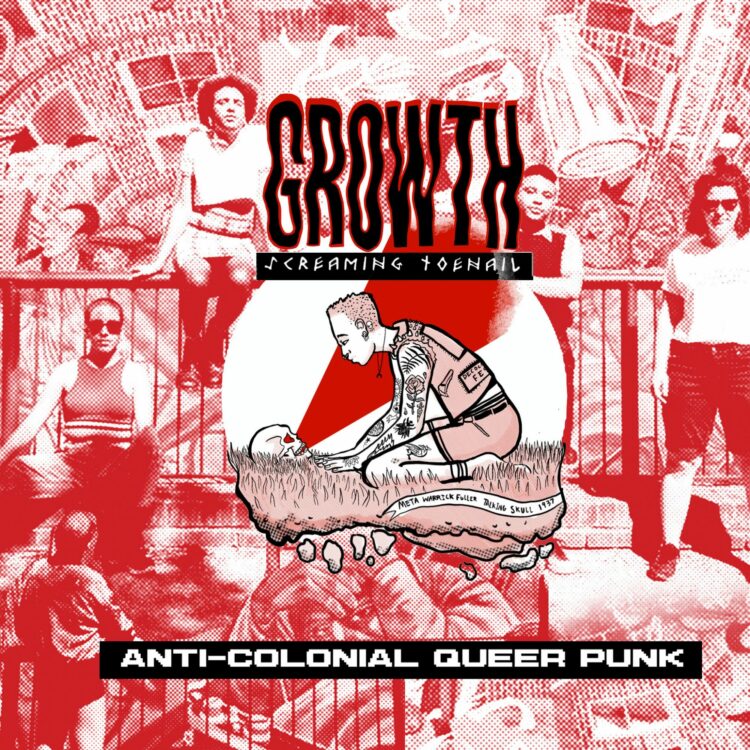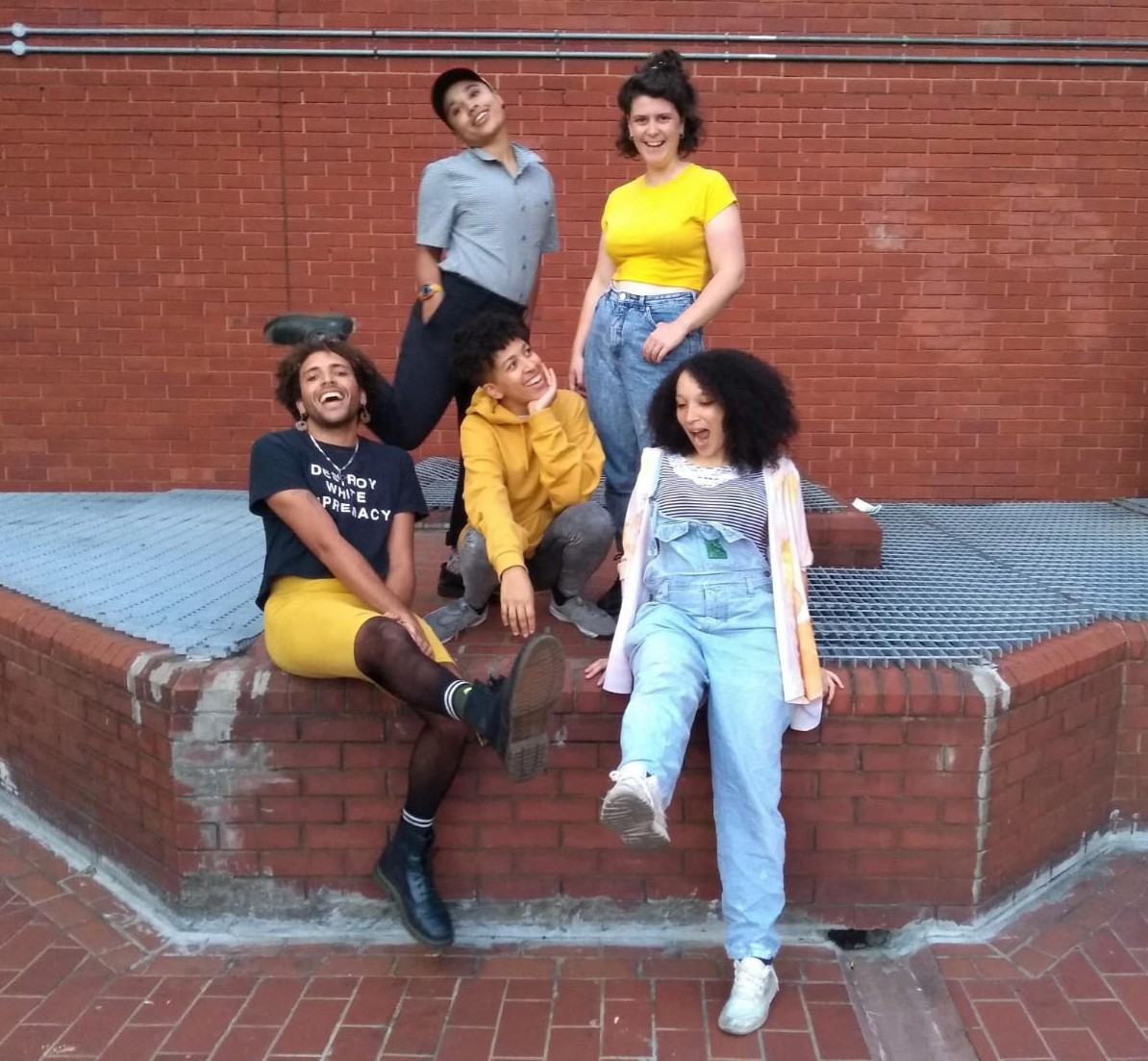
Anthems for the revolution: An interview with decolonial queer punk band Screaming Toenail
Once you’ve seen Screaming Toenail live, you’re unlikely to forget them anytime soon. The four-piece queer decolonial punk band burst onto the London DIY punk scene in 2014 with a tongue-in-cheek attitude that sneered at white privilege while creating fun, bouncy pop-punk that centres marginalised voices.
The band is comprised of lead singer Jacob, drummer Alice, bassist Natasha, and guitarist Nadia. Their sound echoes the rebellious fury of 70s UK punk (Celeste Bell, the daughter of X-Ray Spex singer Poly Styrene sees the band as part of Styrene’s legacy), the dance-funk electricity of ESG, and the lo-fi pop mantra of Le Tigre. Samples of loathsome politician Priti Patel and former UK Prime Minister David Cameron rub up against buzzing guitars and the band’s defiant attitude which refuses to be defined by the ruling class.
Recorded in 2018 with producer Margo Broom at Hermitage Works Studio in North London, the album is the last recording with former guitarist and founding member Niadzi who left the band last year to move to Northern Ireland with her family. MRR spoke to Screaming Toenail to talk about the new album of Toenail classics, why baby Guinnesses are so cute, the DIY punk scene, and this current period in political activism.
MRR: Screaming Toenail has had a few different members over the years. How long have you guys been going as this line-up?
Natasha: A year. I joined just before last year’s Decolonise Fest and Nadia joined a month after that.
MRR: How did Screaming Toenail first get together as a band?
Jacob: It started off in a house that me and Alice lived in Camberwell, jamming with housemates and pretending to be a punk band. The name Screaming Toenail even was a bit of a joke. It just sounded like a punk band. The more we did it, the more I actually felt like this is really fun. The name Screaming Toenail started to take on a bit of more of a serious meaning in the sense that it’s predominantly been that the members of the band have been queer, people of color, or trans people. In terms of thinking of society as a body, it’s people that are often pushed right down to the bottom and it’s our voices screaming and making noise.

MRR: You said most of the members have all been from marginalised backgrounds. Was that intentional when you first started?
Alice: It really was just the people around us and we happen to be part of a community of people who also are queer or marginalised in some way.
Jacob: Yeah, it wasn’t intentional. Before we started the band, I did spoken word. I used to do spoken word dealing with themes of colonialism and histories of resistance. That’s generally a theme that recurs through the lyrics I sing. People who align themselves with those politics are more likely to end up like wanting to be part of the band, I suppose.
MRR: You’re part of a really tight knit DIY scene. Can you talk a bit about the punk scene you’re all involved with?
Alice: When we formed Screaming Toenail, we didn’t realise there was a queer punk scene or a POC punk scene. And then when we found out about it through gigs, I was blown away.
Natasha: For me it was mostly centred around DIY Space and everything that was happening there. I joined Best Praxis and that’s how I found out about First Timers and Screaming Toenail. Now that it’s gone, I don’t know what’s going to happen next.
MRR: Would you say the DIY punk scene offers people a lot more community a lot more friendship and home compared to other music scenes that are more aligned to following a career path and getting signed?
Alice: It changes the way you interact with bands you listen to. If you’re taking part in some way, you’re a lot more invested. You will download their music from Bandcamp. For example, when people who aren’t part of the DIY scene ask about Screaming Toenail, I’m like, if you haven’t been to a show it’s going to sound different to you.
Jacob: I feel like a lot of the music that is in the scene, it’s not about getting signed, it’s actually about like surviving. It’s about processing things. It’s about finding community. I listen to punk music because I need something that I can put in my headphones that’s gonna make me feel powerful when I’m like walking down the street in a really femme outfit and people are giving me dirty looks.

MRR: Growth is your debut album after releasing a few EPs. What made you want to bring out an album now?
Jacob: The album is more like the Toenail classics. The songs that we’ve needed to put out for a long time.
MRR: Was it weird to record these songs that you’ve been playing for so long?
Alice: I thought of the album as like an archive. We’ve played all of these gigs, people in the room have really enjoyed them and we’ve really enjoyed playing them, but then if you don’t record them, they’re forgotten. That’s one of the reasons I was really keen to have a physical copy as well, just because this band means a lot to me. We have to make our own archives because no one else is going to do it.
MRR: You mentioned that the album is classic era Screaming Toenail. Have you been writing new songs? What does this new era sound like?
Jacob: I think the energy is more unapologetically queer now. The band has three non-binary Black people in it now.
MRR: Did you have any particular intentions or influences for your record?
Jacob: I think I think one of the influences was definitely Le Tigre. Working with Margo was amazing and she was really open to like us being silly and playing around with different sounds.
Alice: There’s quite a broad spectrum. Niadzi’s guitar playing is really influenced by Hendrix, she always says that, and there’s Parliament Funkadelic in there and where does that meet with Le Tigre is possibly Screaming Toenail. We want it to be like true to what we what we bring to a show but then the studio has so much freedom.

MRR: I love your Steven Universe cover Giant Woman’. It feels like a lot of punks enjoy the show. What do you think is the connection between punks and Steven Universe?
Natasha: I really like the idea of a planet where literally everyone is what we on Earth would consider women, but are in fact these weird genderless gems. I like to connect that with Crystal Queer’ quite a lot. The show seems to kind of carry on with almost no regard to anyone’s gender. You have Steven, this like chubby kid whose favourite color is pink, and has these three sister mothers. It’s just very, very queer. Even the stuff that isn’t explicitly LGBT.
Alice: There’s something really cool about fusion as well in Steven Universe. The characters can join forces by combining their powers, minds and energies, and they do it by dancing. It’s kind of something that I’ve thought about Screaming Toenail, especially when music emerges out of an organic jamming situation. Maybe Jacob’s got some lines of poetry, and Natasha’s like I’ve thought of these notes. It feels like a bit of a fusion of these things, as you dance you turn into one thing.
MRR: Jacob, how do you develop your lyrics? They’re so descriptive, I love the line in Get Cute’ about someone being as a cute as a half pint of Guinness?
Jacob: A lot of them come from conversations. That lyric, I remember me and Alice getting a half pint of Guinness and just being like, look how small it is. It just looks so cute. I used to do spoken word quite a lot and I used to write poetry and then I realised at one point, I couldn’t write poetry anymore as all of my poems were just punk songs.
MRR: I really liked the song Sever’ could you talk a bit more about the song’s origins?
Jacob: It’s a song that I wrote to process something that happened in Deptford when I went to get my haircut. Basically, it was in like the barber shop and they kept the they just kept putting other people in front of me in the queue. They were like, taking turns playing songs on their iPod and then I realised the songs were all about killing gay people. It made me really sad because the barber shop is already a bit of a sanctuary for me. I had a ritual of going and getting some contour done or getting my facial hair trimmed in a nice way that makes me look pretty. It felt like a literal example of something I feel like is violently enforced by colonialism. This division of like ‘I can’t be in this space because I’m queer but I don’t want to leave.’ I want to actually be part of this scene and I don’t think that there should be that division. The song is me fantasising about being able to build something with people and not feeling like we have to we have to be enemies. I hope that people don’t listen to that song and think it’s me like having a go at Black communities because if you listen to other lyrics on the album, that fear and hatred has been forced on us by colonialism.

MRR: A lot of your songs are political in nature. Is having a political message an essential part of the band?
Natasha: I think that’s an interesting question because you can’t get away from it. If you are the kind of people that we are right, we’re politicised at every turn whether it’s for gender, sexuality, race, creed, nation, all of it. Being able to go through life in a non-political way, I can’t imagine it. I don’t know what that’s like.
Nadia: We did like a photo shoot last week at Cable Street [an area in East London important in Jewish and anti-fascist history] so I feel like that is also a bit of us. We are politicised if we wanted to be or not, but there’s also us being able to show our own politics and not just from the way that we’re perceived.
MRR: How do you feel about this current period of political activism action? Is there some positivity to be found in the Black Lives Matter movement and of mutual aid groups taking off?
Alice: It’s interesting because Screaming Toenail have talked about racism and race and being against white supremacy for a long time. At the moment there’s a certain interest in social media which is a good thing. I think, Jacob, you said this to me a while ago. It’s an exciting moment, but it’s also a bit like, Black Lives Matter now?
Jacob: I’m really happy that Black activists are getting supported in the work that they’re doing and money is going towards services that desperately need it. But I don’t trust any institutions or record labels saying Black lives matter when they don’t have a single Black band signed to their record label.
MRR: On a DIY, grassroots level, what can be done to help support more getting more people of color to form bands and make music?
Nadia: I do think there’s loads of people currently getting involved and organising. I’m trying to make it a bit more open than it is so you don’t necessarily have to befriend someone to be invited into it. But there’s other ways to get to know people. I think First Timers was a really big part of that, but if there’s more involvement from bands of color, hopefully more people of color will go to these workshops and get involved in the music scene.
Growth is out now on Hell Hath No Fury Records, available to stream or download.
